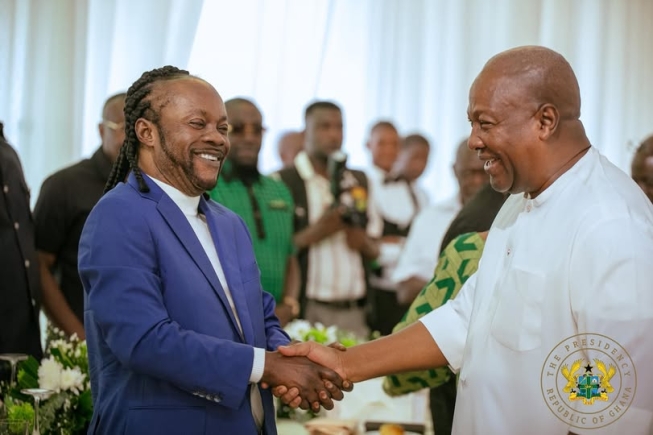Ghana is in mourning following the death of celebrated highlife musician Charles Kwadwo Fosu, popularly known as Daddy Lumba, who passed away on Saturday, July 26, 2025, at the Bank Hospital in Accra after a short illness. He was 60 years old.
The announcement of his death has triggered an outpouring of tributes from political leaders, musicians, fans, and cultural institutions across the country, all paying homage to a man widely regarded as one of Ghana’s greatest musical icons.
President John Dramani Mahama in a statement on Facebook led the national tributes: “Lumba’s unmatched musical genius provided the soundtrack to our lives, carrying us through various phases of life. The beats to his memorable songs may have died down, but his enduring legacy will echo through the ages.” He added, “On behalf of the Government of Ghana, I extend heartfelt condolences to his family and loved ones for this irreplaceable loss.”
Former Vice-President Dr Mahamudu Bawumia also paid tribute, hailing Daddy Lumba as “a pillar in Ghana’s highlife genre” whose works “inspired and uplifted many of us.” He noted that Lumba’s passing is “a huge blow, not only to the music fraternity but to the entire country.”
Former President Nana Addo Dankwa Akufo-Addo described Daddy Lumba as “a pantheon among musical greats of all-time” and a dear friend. “His hit-making songs will remain lasting contributions to my presidential journey and will forever be etched in the annals of political campaigns of the New Patriotic Party,” he said, referencing the singer’s role in the NPP’s campaign music from 2008 to 2016. “May he peacefully rest in the Bosom of the Almighty until the Last Day of the Resurrection, when we shall all meet again.”
The New Patriotic Party (NPP) in an official statement expressed its sorrow, describing Daddy Lumba as “an iconic music legend” whose work served as “a symbol of cultural pride.” The statement, signed by General Secretary Justin Kodua Frimpong, emphasised the emotional and political impact of his famous campaign anthem “Nana Ye Winner,” noting that “its power and inspiration were acknowledged even by our political opponents.”
Felix Kwakye Ofosu, Member of Parliament and Presidential Spokesperson, praised Lumba’s poetic range: “He sang of pain, he sang of love, he sang of hope, he sang of triumph… and then he sang of the inevitability of death.” He added, “Today, his life’s journey has come to an unexpected end and his unmistakable voice has gone silent, never to be forgotten.”
Dr Matthew Opoku Prempeh, a former Minister for Energy, echoed the nation’s sentiments: “A better part of us is left void with the passing of an icon… your legacy will live on in every melody and in every memory.”
Musicians, including Kofi Kinaata, M.anifest, and Kweku Flick, also took to social media to honour the man whose music defined generations. Lumba, known for his powerful voice and emotional depth, released over 30 albums and mentored countless artists.
A statement from the Fosu family, signed by counsel Fati Ali Yallah, confirmed his passing and requested privacy during this period of mourning. “Daddy Lumba was more than a musician; he was a cultural icon whose music touched countless lives,” it read. “His soulful voice provided the soundtrack to our love stories, and his poignant lyrics captured the poetry of our struggles, dreams, and resilience.”
Born on September 29, 1964, in Nsuta near Mampong in the Ashanti Region, Daddy Lumba began his musical career at Juaben Secondary School before moving to Germany, where he met fellow musician Nana Acheampong. The duo, known as the Lumba Brothers, ushered in a new era of highlife music with hits such as “Yɛɛyɛ Aka Akwantuo Mu.”
As news of his death spread, fans gathered at his East Legon residence to pay their respects. Funeral arrangements, according to the family, will be announced in the coming days.
Daddy Lumba’s legacy as a storyteller, musical pioneer, and national treasure is firmly cemented in Ghana’s cultural history.

